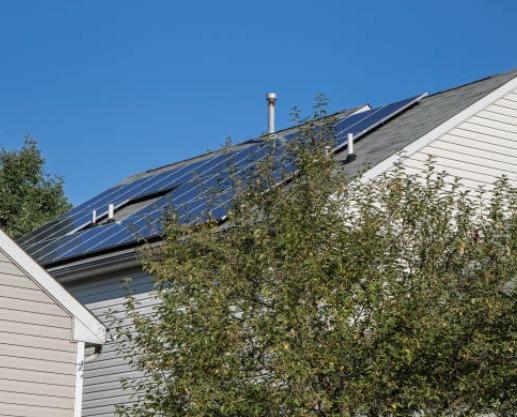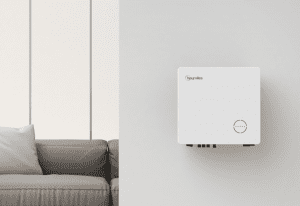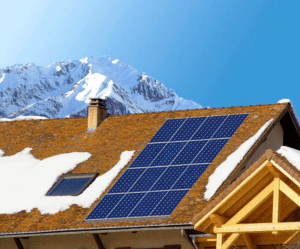20 ways to make your home more energy efficient
Heating, cooling, and lighting a home every day requires a lot of energy. Now, with increasing energy bills stretching budgets and a global focus on climate change, many people are looking for ways to cut their energy consumption.
If you’re looking to cut costs and reduce your carbon footprint, making your home more energy efficient is a great place to start. In fact, with a few small changes, most people could save hundreds or even thousands of dollars each year.
Many homes were not built or fitted out with efficiency in mind, and a lot of home habits we all have can easily be tweaked to save energy. So read on for our top 20 tips on how to make your home more energy efficient.
Seal windows and doors
Anything in your house that opens to the outside world is likely to be a source of heat loss, even when it’s closed, and this is doubly true when it’s made of glass. For this reason, it’s a good idea to test all your windows and doors (by holding a candle near them and watching for flickers). If you find a drafty section, seal the window or door carefully using a draft excluder, weather stripping, caulk, or tape.
Install ceiling fans
Ceiling fans are an excellent way to distribute air more efficiently. A good ceiling fan can make a surprisingly good substitute for a heater or air conditioner, saving energy by creating a breeze to cool or (on a reverse setting) by pushing hot air down into rooms.
Defrost your freezer (and fridge)
Freezers naturally accumulate ice over time, but this reduces their efficiency and increases energy consumption. Try to keep your freezer clear of built-up ice to keep it running as efficiently as possible. Fridges can actually also accumulate ice, particularly near the fan when overfilled, so you may benefit from defrosting it occasionally as well.
Clean fans on appliances
A little-known energy drain in most homes is dirty fans on appliances. Many common household appliances like fridges get clogged up with dust, making the motors have to work harder and making them use more electricity. Over the course of months and years, this extra energy use can add up. Cleaning the dust every few months is a good way to keep them running as efficiently as possible.
Insulate your water heater
Hot water tanks can lose a significant amount of heat, wasting energy and unnecessarily costing you money. Insulating your heater can dramatically reduce the amount of energy being wasted. To do this, you can either purchase a well-insulated heater, or do it yourself using a special insulating blanket.
Seal ducts
If your home uses duct-based ventilation, you may be losing a lot of heated or cooled air into unused areas without even realizing it. Sealing leaky areas with duct tape can cut down any air loss, reducing energy loss.
Unplug rarely used devices
Electronic devices use power if they’re plugged in, even if they’re turned off (or on standby). Usually, it’s a lot less than when they’re turned on, but multiplied across every device in your home, it can waste a lot of energy over time. Avoid this by unplugging devices like TVs, games consoles, and so on when you’re not using them. Even if you don’t want to do this, it’s definitely a good idea to unplug everything you can when you’re going away, like when you’re going on vacation.
Only use chargers for as long as necessary
Charging devices for longer than necessary can also waste energy. Avoid this by keeping an eye on devices while they’re on charge and unplugging them once they’re fully charged.
Set timers
Most air conditioners and heaters include programmable timers. To avoid wastage, try to set timers for everything you can so that you’re only using them as and when you need them as opposed to, for example, leaving the heating on all night.
Choose energy-efficient appliances
This may be easier said than done, particularly if you’re on a budget. However, older and less efficient appliances can use drastically more energy than those built for energy efficiency. If you’re upgrading any appliances or fitting out a new home, always try to find the most efficient ones you can.
Build with better materials
If you’re building a new home, you have the luxury of choosing which materials you want to use. Unfortunately, builders, architects, and developers do not always choose or recommend the most energy-efficient materials, but you can make big energy savings by doing so. Materials like concrete, recycled steel, straw bales, and more can all be good choices, so do your research before choosing what to build with.
Use a “smart” home hub
WiFi-connected home hubs can be a great way to monitor, control, and reduce energy consumption. They’re often very affordable and can significantly improve your energy usage habits, so you may want to invest in one if you don’t have one already. There are also various apps available to help you monitor and control energy usage.
Use south-facing windows
With a large number of south-facing windows in your home, you’ll be able to take advantage of the sun in winter to heat your home, reducing your heating bills. And in the summer, you can simply cover the windows to prevent overheating.
Install solar panels
Another way to harness the sun’s energy to your advantage is to install solar panels on your home. By generating your own power, you’ll need to purchase less from the grid, and may even be able to sell excess energy back to energy companies to further reduce energy costs. Investing in energy storage can also help you use solar energy as efficiently as possible.
Upgrade your windows
As they’re made of glass, windows are a weak point in most homes in terms of heat loss. To reduce the amount of energy wasted through windows, it’s often worth upgrading to higher-quality windows, such as newer double- or even triple-glazed designs.
Insulate your roof
Heat rises, so a huge amount of energy is wasted via poorly insulated roofs. This is especially an issue in older homes. Ensuring that your roof is properly insulated can save you a lot of money over time, often meaning the investment pays for itself within a few years.
Use energy-efficient bulbs
It’s 2022, but many people still rely on highly inefficient lighting in their homes. While it may not seem like a big deal, the least efficient bulbs, such as halogen bulbs, can waste a significant amount of electricity if used throughout a home for a period of years. So, one of the simplest and fastest ways to reduce your home’s energy consumption is to switch to more efficient lighting, such as long-life bulbs and LEDs.
Perform an energy audit
An energy audit will help you to identify how you’re using energy and where savings can be made throughout your home. If you’ve never done one, we strongly recommend it as it can help you find out where to invest in improvements. You can choose to pay a professional to perform an energy audit, or even do it yourself for free.
Use colder water
The default setting on many washers and dishwashers uses water that is warmer than necessary, wasting energy. Doing the laundry and running your dishwasher on a cooler setting is usually just as effective as hotter settings, so it’s an easy way to cut your energy usage every day.
Use your oven less
Ovens are big consumers of energy, and this isn’t helped by the fact we often leave them on for longer than they’re actually in use. Don’t worry, this doesn’t mean you’ll need to cook less. But many of the things we use ovens for on a day-to-day basis can actually be achieved using other, more efficient appliances such as microwaves. Try switching away from using the oven for everything when you can to make noticeable energy savings. Alternatively, you could try switching off the oven a little before the cooking time is up, as the oven will retain its heat for a while.




